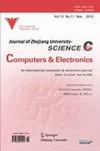Transfer active learning by querying committee
Journal of Zhejiang University-Science C-Computers & Electronics
Pub Date : 2014-02-01
DOI:10.1631/jzus.C1300167
引用次数: 1
Abstract
In real applications of inductive learning for classification, labeled instances are often deficient, and labeling them by an oracle is often expensive and time-consuming. Active learning on a single task aims to select only informative unlabeled instances for querying to improve the classification accuracy while decreasing the querying cost. However, an inevitable problem in active learning is that the informative measures for selecting queries are commonly based on the initial hypotheses sampled from only a few labeled instances. In such a circumstance, the initial hypotheses are not reliable and may deviate from the true distribution underlying the target task. Consequently, the informative measures will possibly select irrelevant instances. A promising way to compensate this problem is to borrow useful knowledge from other sources with abundant labeled information, which is called transfer learning. However, a significant challenge in transfer learning is how to measure the similarity between the source and the target tasks. One needs to be aware of different distributions or label assignments from unrelated source tasks; otherwise, they will lead to degenerated performance while transferring. Also, how to design an effective strategy to avoid selecting irrelevant samples to query is still an open question. To tackle these issues, we propose a hybrid algorithm for active learning with the help of transfer learning by adopting a divergence measure to alleviate the negative transfer caused by distribution differences. To avoid querying irrelevant instances, we also present an adaptive strategy which could eliminate unnecessary instances in the input space and models in the model space. Extensive experiments on both the synthetic and the real data sets show that the proposed algorithm is able to query fewer instances with a higher accuracy and that it converges faster than the state-of-the-art methods.通过提问委员会转移主动学习
在归纳学习用于分类的实际应用中,标记的实例通常是不足的,并且通过oracle标记它们通常是昂贵且耗时的。在单个任务上主动学习的目的是只选择信息丰富的未标记实例进行查询,以提高分类精度,同时降低查询成本。然而,主动学习中不可避免的一个问题是,用于选择查询的信息度量通常基于从少数标记实例中抽样的初始假设。在这种情况下,最初的假设是不可靠的,可能会偏离目标任务的真实分布。因此,信息度量可能会选择不相关的实例。弥补这一问题的一种很有希望的方法是从其他具有丰富标记信息的来源中借用有用的知识,这被称为迁移学习。然而,如何衡量源任务和目标任务之间的相似性是迁移学习面临的一个重大挑战。我们需要了解来自不相关的源任务的不同发行版或标签分配;否则在传递过程中会导致性能退化。此外,如何设计一种有效的策略来避免选择不相关的样本进行查询仍然是一个悬而未决的问题。为了解决这些问题,我们提出了一种基于迁移学习的主动学习混合算法,该算法采用发散度量来缓解分布差异带来的负迁移。为了避免查询不相关的实例,我们还提出了一种自适应策略,该策略可以消除输入空间中不必要的实例和模型空间中的模型。在合成数据集和真实数据集上进行的大量实验表明,该算法能够查询更少的实例,并且具有更高的精度,并且收敛速度比目前最先进的方法快。
本文章由计算机程序翻译,如有差异,请以英文原文为准。
求助全文
约1分钟内获得全文
求助全文
来源期刊
自引率
0.00%
发文量
0
审稿时长
2.66667 months

 求助内容:
求助内容: 应助结果提醒方式:
应助结果提醒方式:


